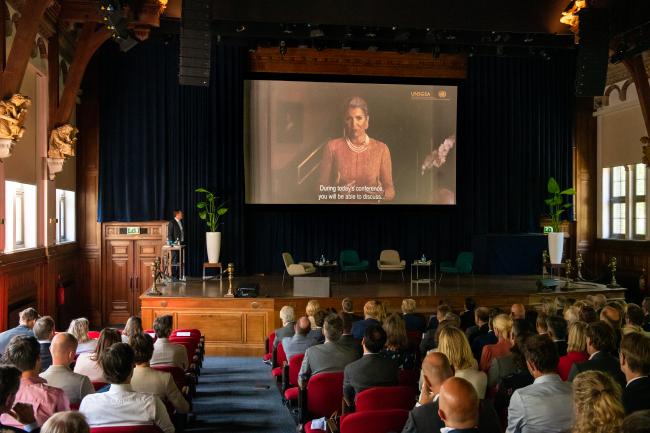
H.M. Queen Máxima of the Netherlands, the United Nations Secretary-General’s Special Advocate for Inclusive Finance for Development (UNSGSA), provided this pre-recorded video address for the AFM Conference: The Future of Financial Services Conduct Supervision on 16 June 2022, for the Royal Tropical Institute in Amsterdam. Click here to watch.
---
Ladies and gentlemen,
It is a great pleasure to celebrate 20 years of the Autoriteit Financiële Markten. I would like to congratulate the AFM for their commitment to promoting fair and transparent financial markets over the last 20 years.
In the Netherlands, we have an efficient and quite competitive market; and the rules and regulations are clear. The key question is: how can we make sure that all this truly works for the benefit of customers; even with the changes that are forthcoming?
This indeed is a good time to pause, take stock, and think about the future opportunities and risks.
In my capacity as UN (Secretary-General’s) Special Advocate for Inclusive Finance for Development, I have witnessed how digital innovation has brought tremendous promise for financial inclusion and financial health.
For example, the rapid growth in mobile phone use and new customer data trails are offering exciting new ways to reach new markets and spur innovation.
But there are also new risks, even in developed markets.
Financial services driven by artificial intelligence can create patterns of bias and exclusion. And algorithms can misinterpret mobile data in ways that make it difficult for small business owners, the elderly, and refugees, for example, to engage.
Consider a pensioner - who is not very digitally savvy - with a small contact list on his phone and no social media accounts. He may not be offered credit or insurance as an algorithm could misunderstand this as him not having a robust social network and no support to rely on if he was behind on his payments.
This is just one example of how algorithms can actually exclude more than include.
There is more work to be done to better understand these risks and to make sure that customers are protected and included in the financial system.
We need to begin speeding up the collaboration. It will be critical to work together. For example, in developing algorithm audit tools and putting in place ombudsmen to assess algorithms on behalf of customers. Or in building public good data pools that help reduce historical biases.
Another important issue is the empowerment of customers and SMEs. They deserve transparency and involvement in the collection, sharing and use of their data.
This is urgent, as big-tech platforms increasingly explore using their customers’ data footprints to embed financial services in social media, e-commerce and entertainment platforms.
Individuals and businesses often do not know the value of the data they create. And even if they do, they find it difficult to assert their rights. Most customers grant consent without reading the terms and conditions, which are often long and hard to comprehend. This is something that we all recognize in our daily lives.
And even if a small business were aware of its data’s value, it would face restricted accessibility. In this way, data become a stranded asset.
For customers it is nearly impossible to share their data trails to get lower insurance quotes or interest rates on loans. They cannot benefit from their own data.
We need to place the customers at the heart of all activities and act upon their needs and capacities. Digital products and services should not only do no harm: they should do good as well. Are they helping customers be more resilient? Do they support financial health?
For example, credit products can help people meet their long-term goals. But too much debt can damage financial health. Emerging models such as buy-now-pay-later could be effective in smoothening consumption. But use of credit for everyday needs could also be a signal of financial stress. Adopting a financial health perspective can provide useful early warning of rising debt burdens.
There are many opportunities to promote financial health. Think of savings products with nudges to help people meet a financial goal, perhaps for a holiday. ‘Save-now-pay-later’.
And: financial health makes business sense. Financially healthy customers can pay their loans on time, purchase other products and services, and cost less to serve. In addition, they are three times more likely to recommend the institution to others.
An essential step to support financial health is measurement of course. For example, by encouraging financial institutions to track the financial health of their customers.
During today’s conference you will be able to discuss all these important issues. How can we mitigate bias from algorithms? How can we empower individuals and SMEs with their own data? How can we encourage the development of financial products that enhance customers’ resilience and financial health?
We are lucky to have many leading supervisors, regulators, policymakers, and financial sector practitioners here today, from the Netherlands and other European countries. Your role is crucial. I wish you every success in your efforts to create a digital financial system which benefits everyone.
Thank you.